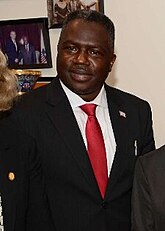Top Qs
Timeline
Chat
Perspective
Vice President of Liberia
Deputy head of state and government of Liberia From Wikipedia, the free encyclopedia
Remove ads
The vice president of the Republic of Liberia is the second-highest executive official in Liberia, and one of only two elected executive offices along with the president. The vice president is elected on the same ticket with the president to a six-year term. In the event of the death, resignation or removal of the president, the vice president ascends to the presidency, and holds the position for the remainder of their predecessor's term. The vice president also serves as the president of the Senate and may cast a vote in the event of a tie. The current vice president is Jeremiah Koung, serving under president Joseph Boakai. He began his term on January 22, 2024.
Remove ads
Qualifications
Article 52 of the Constitution lays out the qualifications for candidates for vice president. To be eligible for office under the current Constitution, a vice presidential candidate must:
- be a natural born citizen of Liberia;
- be at least thirty-five years old;
- own real property valued at least $25,000;
- have resided in Liberia for at least ten years.
Additionally, the vice president may not reside in the same county as the president.
Remove ads
Succession
Summarize
Perspective
Under Article 63(b), the vice president ascends to the presidency in the event of president's death, resignation, impeachment, or when the president is declared incapable of carrying out the duties of the office. In the event of ascension, the vice president serves as president for the remainder of their predecessor's term, though this period is not considered a term for the purposes of term limits to the presidency. According to Article 63(a), should the president-elect die or become otherwise incapacitated before his or her inauguration, the vice president-elect is sworn in as president in their place, though a term of this nature does constitute a term for the purposes of determining term limits.
To date, five vice presidents have ascended to the presidency, either due to the president's death, resignation, or removal from office: James Skivring Smith, Alfred Francis Russell, William D. Coleman, William Tolbert, and Moses Blah.
There have been twelve vacancies in the office, the first of which occurred between October 26, 1871 and January 1, 1872; after the ascension of James Skivring Smith to the office of president. The most recent vacancy was between August 11, 2003 and January 16, 2006; after the ascension of Moses Blah to the office of president and prior to the election of Joseph Boakai.
Remove ads
List of officeholders
Summarize
Perspective
- Political parties
- Other affiliations
- Symbols
† Died in office
Remove ads
Timeline

See also
Notes
- President Roye was forcibly removed from office on October 26, 1871. Vice President Smith was sworn in and served the remaining two months of Roye's presidency with no vice president.
- President Gardiner resigned from office after falling seriously ill. Vice President Russell served as president for the remaining year of Gardiner's term with no vice president.
- President Cheeseman died in office. Vice President Coleman served as president for the remainder of Cheeseman's term with no vice president, and then was elected president in his own right in 1897 with Joseph J. Ross as his vice president.
- Vice President Ross died in 1900, leaving President Coleman without a vice president. On December 11, 1900, Coleman resigned, and Secretary of State Gibson served as president for the remainder of Coleman's term without a vice president, before being elected in his own right in 1901 with Joseph D. Summerville as his vice president.
- Vice President Summerville died in July 27, 1905 following his and President Gibson's reelection but prior to their inauguration. As no mechanism existed for replacing a vice president, which would have left Gibson without a vice president for his entire term, a constitutional amendment was ratified that year allowing for the president to call a special election in the absence of a vice president to fill the vacancy. J. J. Dossen won the special election in 1905 and was inaugurated along with Gibson in 1906.
- Both President King and Vice President Yancy resigned on December 3, 1930. Secretary of State Barclay was inaugurated as president, and Vice President James Skivring Smith Jr. was elected in a special election soon after.
- President Tubman died following his and Tolbert's reelection in 1971, but prior to his inauguration. Tolbert served the remainder of Tubman's sixth term before being inaugurated for Tubman's elected seventh term.
- Warner was ousted along with the rest of the government by the Armed Forces of Liberia.
- During 1980–1981 Thomas Weh Syen was Doe's second-in-command in the military administration. Weh Syen was in charge on vice-presidential duties.[2] After Weh Syen was executed on Doe's orders, he was replaced as Vice Head of State by Nicholas Podier.[3]
- Roland Diggs served as Vice President in the administration of Amos Sawyer from August 1990 to April 1991.[4] He was succeeded in April 1991 by Peter Naigow,[citation needed] who also resigned. There were many Deputy Chairmen of the Council of State of Liberia during 1994–1997, including Dexter Bah Tahyor, Isaac Musa, Charles Taylor, G. V. Kromah, George Boley, Oscar Jaryee Quiah and Tamba Tailor.[5]
- During this time, the National Transitional Government of Liberia was in charge of government duties. Vice-Chairman Wesley Momo Johnson assumed the duties and powers of the office of vice-president during part of this period.
Remove ads
References
Wikiwand - on
Seamless Wikipedia browsing. On steroids.
Remove ads





















